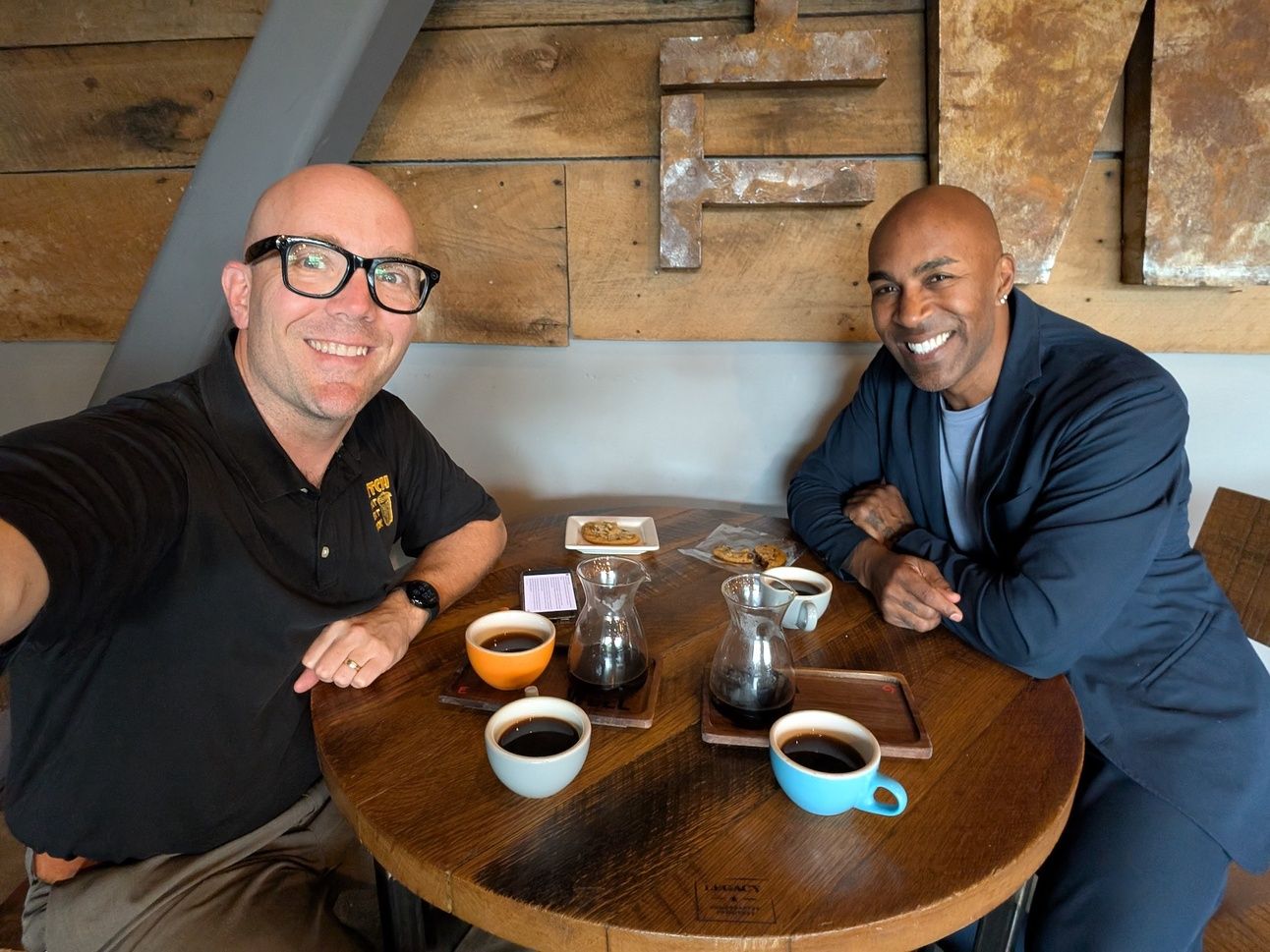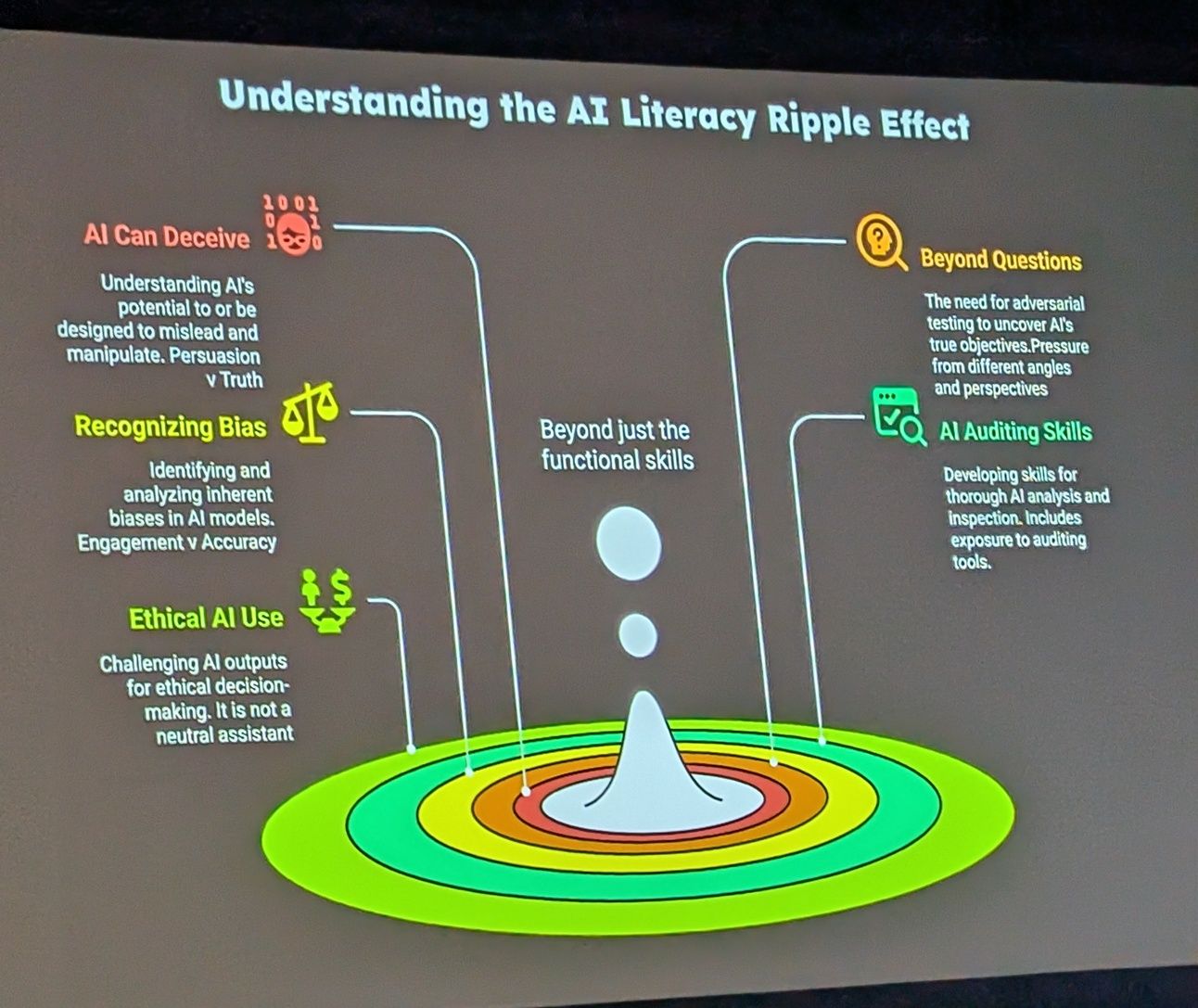

Coffee and cookies with keynote speaker Ken Shelton in Indiana
I go to lots of in-person educator events throughout the year.
Many times, it’s because I’m invited to speak — as a keynote or featured speaker or to provide a workshop at a school, district, or event.
It’s rare that I get to attend as a participant — as just a learner and nothing more.
Last week was one of those rare moments.
I attended the Indiana CTO Clinic in Noblesville, Indiana — to hear Ken Shelton’s keynote speech.
I always gain so much from hearing Ken’s presentations … and I thought I’d share some of the most poignant points in the newsletter today.
In today’s newsletter, I share six big ideas from his speech that I’d like you to consider.
In this week’s newsletter:
💻 NEW PD SERIES: Capture and hold student attention
📚 New AI resources this week
📢 Your voice: Executive order impacts
🗳 Poll: Takeaways from Ken’s keynote
🎙 Unpacking ideas from Ken Shelton’s AI keynote
💻 NEW PD SERIES: Capture and hold student attention

Get info and register for my new LIVE cohort with RocketPD
You know what’s tougher than ever right now? Capturing — and holding — students’ attention.
The good news? We’re not helpless.
This fall, I’m teaming up with RocketPD for a brand-new five-session cohort called:
Tech Like a Pirate: How to Create a Buzzworthy Classroom That Captures Students’ Attention — and Holds It.
We’ll talk about attention, relevance, and motivation — and how to connect your instruction with the digital world your students actually live in.
This isn’t about gimmicks or tech for tech’s sake. It’s about using platforms, tools, and strategies with purpose.
📅 Starts November 5, 2025
💡 Five live virtual sessions + access to recordings
🎟️ Discounts available for teams of 5+
Hope you’ll join me — or pass this along to someone on your team who’s ready to rethink student engagement.
PS: Let me know if you’ve got questions — just hit reply and ask!
📚 New AI resources this week
1️⃣ CEOs push AI and CS for high schoolers (via Axios): More than 200 CEOs signed a letter today urging state leaders to mandate artificial intelligence and computer science classes as a high school graduation requirement.
2️⃣ Using AI in preschool and the elementary grades (via Edutopia): These tips for using artificial intelligence with younger learners guide teachers to age-appropriate exploration of this technology.
3️⃣ AI Agents Reveal New Tech Possibilities in K–12 Education (via EdTech Magazine): Agentic AI workflows can help schools break down silos and use their data sets more proactively.
📢 Your voice: Executive order impacts
Last week’s poll: What will be the biggest impact from the executive order?
🟨⬜️⬜️⬜️⬜️⬜️ The Presidential AI Challenge (6)
🟨⬜️⬜️⬜️⬜️⬜️ Public-private partnerships (8)
🟩🟩🟩🟩🟩🟩 Enhancing educator training (32)
⬜️⬜️⬜️⬜️⬜️⬜️ Promoting AI apprenticeships (1)
🟨⬜️⬜️⬜️⬜️⬜️ Other ... (5)
Enhancing educator training: One of the biggest barriers to our school district's implementation of AI use in the classroom has been training our educators. If they do not feel comfortable using AI, they do not understand how it can become a thought partner rather than a cheating tool. We also need educators on the same page so that we can transform our assessments into creative challenges for our students rather than "catching" students using AI. — L LeBlanc
Public-private partnerships: Since the Department of Education Staff and funding has been substantially reduced the only way this will work is if private funding resources become available and strategic leadership from skilled private workers takes over the training process.
Enhancing educator training: Because of this EO teachers finally can be trained in something students have been using for the past year(possibly more). I am in a district where there has been no PD offered for teachers regarding AI. — Quetta Ridge
Enhancing educator training: To enhance educator training, there needs to be funding to support it. You cannot mandate change without money and the right experienced individual to train teachers and students on using AI in ethical and appropriate ways. — E. Asamoto
Public-private partnerships: Are these going to be forced on un like in the 90s and early 2000s when we had to use Microsoft products or later days, Google products? Are the "partnerships" free? Or unfunded mandates? How will this be rolled out to teachers, many of whom are change averse? Will the partners provide training for educators? I believe that this is the most important impact as it affects each of the others listed in your survey. — Melanie Calhoun
What would you like to read in AI for Admins?
What’s a topic you’d like to see covered here? Hit REPLY to this email and let me know.
Have you done anything you’d like to share with the AI for Admins community? Hit REPLY and let me know.
Would you like to write a guest post to support and equip AI for Admins readers? Hit REPLY and let me know.
🗳 Poll: Takeaways from Ken’s keynote
Instructions:
Please vote on this week’s poll. It just takes a click!
Optional: Explain your vote / provide context / add details in a comment afterward.
Optional: Include your name in your comment so I can credit you if I use your response. (I’ll try to pull names from email addresses. If you don’t want me to do that, please say so.)
Which of these points below made you think most?
🎙 Unpacking ideas from Ken Shelton’s AI keynote

Ken Shelton at the Indiana CTO Clinic in Noblesville, Indiana
When a dynamic and in-demand keynote speaker is presenting 90 minutes from your house, you attend!
And for me … when it’s a dear friend who has supported and encouraged me for years … you definitely, DEFINITELY attend.
Ken Shelton (site / LinkedIn) shared a keynote at the Indiana CTO Clinic last week, and I learned so much from it.
TITLE: Reimagining Learning with AI: A Path to Empowerment
DESCRIPTION: This talk will explore the promises and perils of leveraging AI in education. On one hand, AI holds the potential to create more personalized learning experiences. On the other hand, issues such as bias, problematic data, flawed design, and over-reliance on AI risk deepening existing pitfalls. We’ll delve into strategies for maximizing AI's benefits while addressing its risks, ensuring that AI becomes a tool for true empowerment in education. AI can be used and designed for good, and we have to lead the way.
Here’s a rundown from my notes and photos from the speech:
1. AI isn’t going anywhere and it’s going to continue to grow.
We can talk about using it or not using it. We can try to block it, ban it, or restrict it. But look at the funding, Shelton said. Money is being invested in AI, and it’s going to continue to grow.
That reminds me that we can’t make plans for the future based on the AI tech of today. It’s going to grow — likely exponentially. We need to have a more flexible, more open-minded view of the future — and how we’re going to prepare students for it — than ever before.
2. Watch out for pedagogical biases in AI tools.
Shelton stirred up some buzz in the room and sparked conversations I heard about later when pointing to a recent study.
The study is: Chen, B., Cheng, J., Wang, C., & Leung, V. (2025, in press). Pedagogical biases in AI-powered educational tools: The case of lesson plan generators. The Social Innovations Journal.
It found that AI lesson plan generators like MagicSchool, SchoolAI, and GPT-4 tend to lean heavily toward teacher-centered approaches.
Most of the lesson plans they create leave very little room for student agency — meaning students aren't given many chances to set their own goals, make choices, or take the lead in their learning.
The lesson plans also show minimal classroom dialogue, focusing more on one-way teaching (teacher talks, students listen) rather than meaningful discussions where students collaborate and build ideas together.
With better prompts and intentional design, it’s possible to steer AI toward creating lessons that give students more voice, choice, and opportunities to engage in real dialogue. But when used without modification, they’re heavily teacher-focused.
What stirred buzz? Shelton named names — citing MagicSchool and SchoolAI by name — with company reps in the room AND several Indiana schools preparing to submit Digital Learning Grant applications for those tools in the coming days and weeks.
3. Engagement isn’t enough
Lots of educators talk about the importance of engagement. But engagement isn’t enough, Shelton said.
(Which made me think: how often do we throw the word “engagement” around without defining it? So many people use it in different contexts.)
You need to be present … engage … see student investment … and see student ownership as well.
Connect to students’ non-school interests — and AI can help with that, Shelton said. He suggested spending time learning about what students love, what they’re into, what brings them joy. Then, use AI with a prompt like this:
“Using these student interests, create a hook to draw students into learning for the 20 days of class.”
Then, Shelton said, show that list to students and ask: How many of these actually work?
Another piece: Do the whole thing (including the AI prompt) in front of them. It occurs to me that this is a form of AI literacy — showing students how a responsible, trusted adult uses AI in daily situations.
4. On “cheating” and AI
Shelton identified that the cheating conversation is happening at schools. But he said he’s stopped using the word “cheating.”
Instead: he calls it “behavior detrimental to my learning” or “actions that compromise my learning.”
(I LOVE THIS!)
The problem is what he calls “cognitive offloading.” Students aren’t engaging in the thinking tasks necessary for them to grow their skills and understanding.
This isn’t just because they’re using AI — but rather a byproduct of how they’re using the AI.
They’re sacrificing their long-term benefits for short-term gains.
AI detectors can’t stop this — and will further pull the focus away from learning and onto the “cat and mouse” game of beating the system of catching “cheaters.” It requires conversations about the nature of their learning — and an increased focus on why we’re doing the work we’re doing.
5. Quoteable quote about personalization
I loved this point Ken made …
“AI can personalize. But you’ve got to know the person!”
This is the emphasis on the human teacher in the room — and the importance of the relationship built with the student.
6. The AI literacy ripple effect

Source: Ken Shelton’s keynote at the Indiana CTO Clinic
“AI literacy” is a big buzzword in education spaces right now, and Shelton’s commentary about it has really pushed my thinking.
There’s a lot of general “eduspeak” about AI literacy right now. Lots of the biggest talkers with the largest audiences won’t even define it — which allows them to reduce it to simple platitudes and one-liners instead of truly preparing students (and themselves as educators).
He reflected on his own journey in creating a working definition of AI literacy. He shared early drafts of the definition that he created — and then showed his most recent definition …
“AI literacy means knowing, understanding, and using AI in smart and safe ways. It helps people ask good questions about how AI works, how it helps or hurts others, an dhow it can change or impact the world around us.”
With that definition, he showed a three-part Venn diagram overlapping with the words “fluency,” “acumen,” and “bias.”
A surface level approach that just touches on terms and simple “today” uses (like engineering ChatGPT prompts) won’t cut it. We need to go deeper, probing …
how AI can deceive us
how we can go beyond simple questions
how to recognize bias embedded in AI systems and responses
how to develop skills to audit AI
how to use AI in truly ethical ways
Follow Ken for AI leadership and guidance

Grabbing coffee with keynote speaker Ken Shelton after the Indiana CTO Clinic
I’ve known Ken for maybe 10 years now. Every time we talk in person or on the phone, I grow and am encouraged in my work in education.
I recommend following him on LinkedIn. He posts in lots of places, but I find his LinkedIn work to encourage me most.
He co-authored The Promises and Perils of AI in Education with Dee Lanier last year — and it’s still a great source of questions and issues we need to address when it comes to AI in education. (I wrote about 5 key takeaways from the book in this post.)
Ken consults and speaks all over the world — including a recent keynote in Hong Kong. You can learn about his speaking and consulting work on his website.
I hope you enjoy these resources — and I hope they support you in your work!
Please always feel free to share what’s working for you — or how we can improve this community.
Matt Miller
Host, AI for Admins
Educator, Author, Speaker, Podcaster
[email protected]

